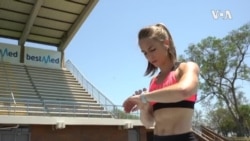Organizers of the Tokyo Olympics say they will have measures in place next year to limit the spread of the coronavirus. The Olympics were set to take place this past summer, but delayed until 2021 because of the virus.
Little is known about how the virus affects the long-term health of individuals who were already infected, including athletes. South African researchers are leading an international effort to try to find answers.
Wenda Nel, a South African runner, has recovered from COVID-19, the disease caused by the virus. Nel told VOA that she is happy to be running again in preparation for the Tokyo Olympics.
"It was about two to four weeks that I've took it very slowly with the training. Checked my heart rate every training session. And from there, I actually went into full program. And I feel stronger…and actually fully recovered right now.”
Martin Schwellnus is a Professor of Sport and Exercise Medicine at the University of Pretoria. He directs the university’s Sport, Exercise Medicine, and Lifestyle Institute (SEMLI).
Schwellnus is leading a group of scientists in setting guidelines for doctors who treat athletes recovering from serious respiratory infections, including the coronavirus. The Sport, Exercise Medicine, and Lifestyle Institute launched the international AWARE Research Study as part of this work. The project includes information from the COVID-19 Recovery Clinic for athletes.
Schwellnus says COVID-19 seems to affect many different organ systems.
"In the returning to sport, it could result in medical complications. And to date, we don't really know what these are for COVID. And so, the focus of the project is to investigate what happens in an athlete when they had COVID and how does the body heal and respond."
The project uses an online questionnaire to gather information from any person training for three hours a week who had serious respiratory infections, including COVID-19. Those recovering from the disease can join the COVID-19 Recovery Clinic for help returning to sports.
Marcel Jooste is both an athlete and a medical doctor. He joined the clinic after he recovered from COVID-19, which he caught from a patient.
Jooste told VOA that he has done all expected of him so that he could return to training. He adds that he is required to tell doctors how he feels following physical exercise.
The research examines COVID-19's effect on all organ systems.
Early findings show that athletes who have had COVID-19 find low-intensity exercise to be harder and recovery time much longer than from other respiratory infections.
Kelly Muller is a rehabilitation specialist at the University of Pretoria's SEMLI. She says evidence-based guidelines should help recovering athletes to better and more safely prepare for the Olympic games.
"If an athlete does happen to contract COVID-19, it would be really important and really valuable for coaches and medical professionals to have evidence-based advice to guide that athlete back to their performance in the shortest time possible."
For Wenda Nel and other athletes recovering from the infection, the research could help them come home from Tokyo as Olympic champions.
I’m Jonathan Evans.
Marize de Klerk reported on this story for VOA News. Jonathan Evans adapted this story for Learning English. George Grow was the editor.
________________________________________________________________
Words in This Story
athlete – n. a person who is trained in or good at sports, games, or exercises that require physical skill and strength
check – v. to look at (something) carefully to find mistakes, problems, etc., or to make sure there is nothing wrong with it
complication – n. something that makes something harder to understand, explain, or deal with
rehabilitation – n. restoration especially by therapeutic means to an improved condition of physical function
respiratory – adj. related to the movement of air or dissolved gases into and out of the lungs
session – n. a period of time that is used to do a particular activity





